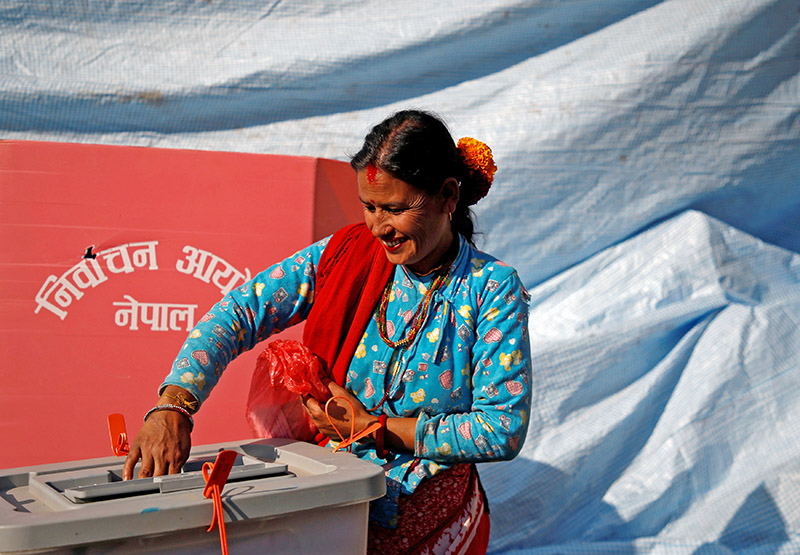Nepal votes in landmark poll; army blames rogue Maoists for blasts
- Nepal holds first parliamentary election since 1990
- Voting begins in first phase, second phase on Dec. 7
- Maoist splinter group blamed for series of small blasts
- India and China compete for influence in buffer state
KATHMANDU: Nepalis began voting for a new parliament on Sunday with the army on alert on Sunday as a series of small blasts blamed on a rogue Maoist group reminded the Himalayan nation of the violence and instability it is hoping to leave behind.
More than a decade after the end of a civil war between Maoist peasant guerrillas and security forces, Nepal is hoping this election - the first parliamentary polls since 1999 - will complete its long journey from a monarchy to become a federal republic.
A second phase of the election will take place on Dec. 7, and the election commission has said that the final results probably won't be known for several days because of the cumbersome counting procedures.
A Maoist splinter group was behind a series of small blasts in the run up to the polls, army spokesman Nain Raj Dahal said, adding that security forces have defused around 30 improvised explosive devices since Friday.
For all the security concerns, voting was largely incident-free.
"Except for some minor complaints from a few places, polling in all areas is smooth and peaceful so far," Ila Sharma, a member of the Election Commission told Reuters.
Suresh Balsami was the first voter at Kagatigaun polling centre, about an hour's drive mostly on a dusty and winding road from capital Kathmandu.
"I voted for peace, development and prosperity of the country," said the 32-year-old bus driver, as other voters began to trickle into the polling centre in a public school ringed by pine trees.
Candidates have used everything from mules to drones flying their party flags to reach voters in remote areas with no roads, according to media reports.
BATTLE FOR INFLUENCE
Nepal voted in 2008 and 2013 for a Constituent Assembly, which doubled as parliament, to write a post-monarchy charter that plotted the course to becoming a federal republic.
More than 15 million eligible voters will pick a 275-member legislature, the first under a new constitution agreed after years of wrangling.
Simultaneously, voters will choose representatives to seven provincial assemblies for the first time since Nepal abolished the monarchy in 2008.
The centrist Nepali Congress party, considered a pro-India group, has formed a loose electoral alliance with the Madhesi parties from the country's southern plains bordering India and former royalists.
Facing the alliance is a tight-knit left coalition between the former Maoist rebels and the main opposition Communist UML party, perceived to be closer to China.
Wedged between India and China, Nepal needs to balance ties, but the outcome of the election could determine which of the Asian giants gets the upper hand in the battle for influence in the buffer state.
Both are looking to benefit from Nepal's potential as a source of hydropower.
Home to Mount Everest, and one of the poorest countries in the world, Nepal depends on tourism and aid. More than one-fifth of its 28 million people survive on less than $1.90 a day, and parts of the country are still recovering from a devastating earthquake that killed 9,000 people in 2015.
Rita Shrestha, a 49-year-old housewife whose house was damaged in the tremor, rued the slow pace of reconstruction.
"We need roads, water supply, electricity, health care and jobs so our children are not forced to go abroad to work," Shrestha, wrapped in a red woollen shawl, told Reuters after casting her vote.
Millions of young Nepalis work mainly as labourers in the Middle East, Korea and Malaysia.






